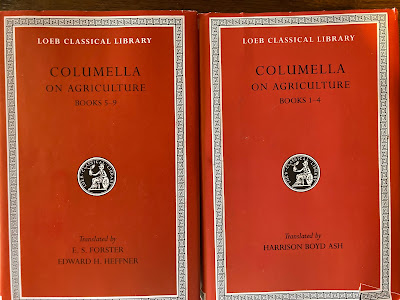I have been trying to "eat along" with The Ravishing Mrs. TB as she is embarking on her dietary adventure (modified keto). On the whole, this means a great many vegetables and proteins and not much else. For me, more protein for training (trying to keep at that 1 g/ 1 lb ratio), but otherwise I am trying adhere in principle to what she is trying to accomplish. And it is certainly no great sacrifice: we still get plenty of protein through meat or eggs (and steak. We are eating more beef. This makes me happy.) and the vegetable servings are rather large, prepared in different ways, and (sometimes) surprisingly delicious.
As we have gone through this process, I have been shocked to realize a great many things about my own food choices.
I liked to think I was (overall) fairly thoughtful and measured in my food choices, that I overall ate healthy. Yes, I had a few issues - I do like my desserts! - but I thought I was doing pretty well.
Guess what? Not quite so much. To paraphrase a relatively "modern" pop song (at least for me), "I like empty carbs and I cannot lie".
By thinking more actively about what I am eating, I find that I am also thinking a lot more when I do not eat about what I would be eating. And generally - outside of regularly meals - my input looks a great deal like carbs - generally empty, and a lot of them.
I am a food texture sort of fellow. I like things that crunch in my mouth, and I like salt - so anything that looks like a pretzel, cracker, or that it might be remotely crunchy is something that is in danger of being eaten. Which is okay of course - in moderation, anything can be fine. Unfortunately, moderation is not a thing I am always particularly good at.
And so, I try to find better alternatives for crunch or not eat them at all.
It is certainly not like I am suffering - there are more than enough other things I can (and do) eat and eat with gusto (if a word like "gusto" can be applied to something like celery). And it has made me more conscious overall of how I am eating, never a bad thing when diabetes lurks in the background of one's genetics like a minor theme in a bad horror movie, always ready to leap out with a cheap scare.
Eating well, as they say, is no more difficult than eating poorly: one just has to make conscious choices and pay attention. What is fascinating to me - and depressing at the same time - is how hard commercialism and society works to ensure that making such choices is difficult.
One of the keys, as it turns out, to this process is simply that eating this way looks a lot like simple cooking. The recipes made are not terribly elaborate: a protein, perhaps a sauce, and a vegetable suitably roasted/broiled/slightly seared. But they take time - all of The Ravishing Mrs. TB's meal prep now takes more time, chopping and slicing and packaging up. Convenience as it comes in a box or bag or prepared by someone is much quicker.
Along with simplicity in recipes, our grocery list has gotten a great deal simpler: protein, vegetables, fruit (for me, not her right now), and some dairy. That is largely it. I eat protein bars and whey for training, but not much more processed food than that.
So it becomes - from a commercial point of view - a losing proposition for everyone except the grocery stores: much less products purchased and minimal processed foods purchased, and virtually no restaurants or delivery services engaged.
(Yes, I know many of live like this normally and have for years. Please be patient with me, I am slow in any number of ways).
So the paradox is that a diet that is better for us is not necessarily "better" for modern society - to those that decry modern agriculture and modern food processing in terms of a "better world", all sorts of financial implications from this occur: less employment in these industries, less taxes collected from these industries, less people employed packaging and transporting and cooking and serving and delivering food with the implications that their unemployment, purchasing, and tax collection brings.
All this from simply eating better and different. It makes me wonder - for the thousandth time, perhaps - that we have not trained ourselves in critical thought in the way we should.
Would more natural eating be better for any number of reasons? Of course; obesity is a growing trend in the US and modern agricultural practices (my mind says practiced by corporate agriculture, but it could be by anyone) can be destructive and wreak long term impacts on the land we need to grow the food. Yet all these implications - financial capital, human capital - flow from it. Those are never addressed at all.
Which, to be frank with you, is probably a lot more than I need to be thinking about the subject. I am just working to be more thoughtful about my food and when and why I eat.
And, of course, working hard to make the peanut butter fit elegantly into curve of my celery to make it more palatable than struggling to smear it just on the side.
